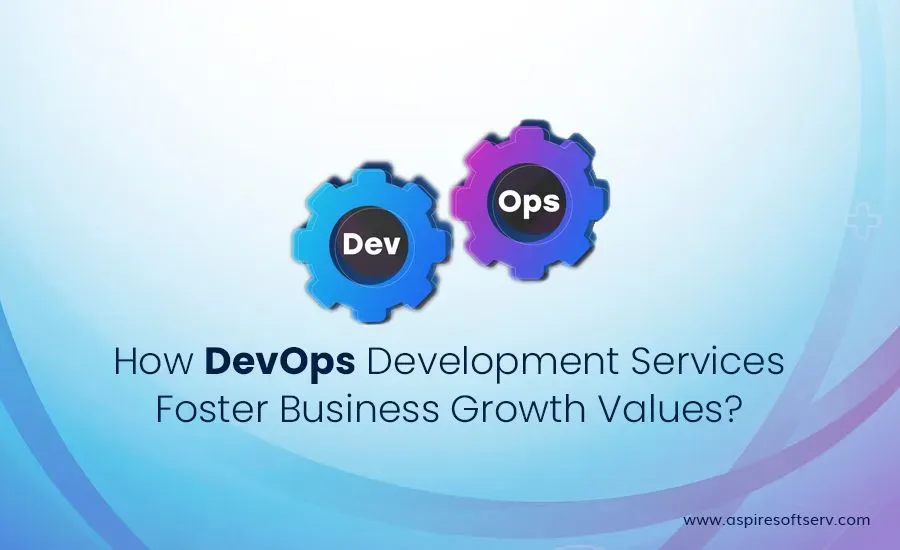
Businesses are continually seeking ways to accelerate growth and maintain a competitive edge in today's fast-paced digital environment. One highly successful strategy is the adoption of DevOps Services. DevOps is more than just a buzzword; it's a methodology that brings tangible benefits to businesses aiming to streamline operations, enhance collaboration, and ultimately drive growth.
In this comprehensive exploration of DevOps and its business values, we'll delve into the importance of DevOps development services, illustrating each point with practical examples. As part of our commitment to industry recognition and collaboration, we're pleased to share that AspireSoftServ has been featured on DesignRush, a platform showcasing leading Software Development Companies in India. You can find our profile here: AspireSoftServ on DesignRush. This recognition is a testament to our dedication to excellence in software development and our ongoing efforts to provide innovative solutions to our clients.
DevOps Services: Streamlining the Development Lifecycle
1. Faster Time-to-Market:
In the competitive business world, speed is crucial. DevOps emphasizes automating the software development lifecycle, from code commit to deployment. This results in faster release cycles, enabling your company to deliver new features, updates, and fixes to customers much quicker.

Example: Imagine a software development company that embraces DevOps. They release new software updates every two weeks instead of monthly by automating testing, building, and deployment processes. This rapid delivery keeps customers engaged and ensures the company remains responsive to market demands.
2. Improved Collaboration:
DevOps fosters collaboration between development, operations, and quality assurance teams. Breaking down silos and encouraging open communication results in better alignment of goals and faster issue resolution.

Example: Incorporating DevOps development services principles, a development company sets up cross-functional teams that include developers, testers, and operations specialists. Daily stand-up meetings and shared tools help everyone stay on the same page, leading to quicker decision-making and smoother coordination.
3. Enhanced Quality:
Quality is non-negotiable in today's tech landscape. DevOps practices like continuous integration and continuous testing ensure that software is thoroughly tested at every stage, reducing the likelihood of defects reaching production.

Example: By implementing Cloud DevOps Service, a mobile app development company performs automated tests on every code commit. This catches issues early, allowing the team to address them promptly. As a result, the app experiences fewer crashes and glitches, leading to higher user satisfaction.
4. Increased Efficiency:
Automation lies at the heart of DevOps. Automated procedures take the role of repetitive manual chores, freeing teams to concentrate on more strategic and innovative projects.

Example: A cloud services company adopts DevOps automation to provision and manage virtual servers. This eliminates the need for manual server setup, reduces human errors, and ensures resources are allocated efficiently.
5. Swift Issue Resolution:
DevOps enables rapid identification, isolation, and resolution in case of issues or bugs, thanks to automated monitoring and detailed logs.

Example: A SaaS company monitors its application performance in real-time using DevOps tools. When a sudden increase in error rates occurs, the team receives alerts and quickly identifies a misconfigured database connection. The issue is resolved within minutes, minimizing downtime and user impact.
DevOps Development Services: A Paradigm Shift
Expanding on the notion of DevOps development services, it's crucial to understand the paradigm shift occurring in the software development landscape. Traditionally, development and operations teams operated in isolation, leading to inefficiencies and delays. DevOps development services break down these silos, fostering a culture of collaboration and shared responsibility.
In a DevOps-driven environment, the focus shifts from individual tasks to collective goals. Developers, operations specialists, and quality assurance teams work hand in hand, ensuring that every aspect of the software development process is optimized. Daily stand-up meetings, shared tools, and a unified approach to problem-solving become the norm.
Cloud DevOps Service: Unlocking Scalability and Flexibility
Now, let's explore the significance of cloud devops service in the context of accelerating growth. Cloud computing has revolutionized the way businesses operate, offering unparalleled scalability and flexibility. When integrated with DevOps practices, the result is a powerful synergy that propels businesses forward.
Imagine a scenario where a company leverages Cloud DevOps Service to dynamically provision and manage virtual servers. This not only eliminates the need for manual server setup but also ensures that resources are allocated with maximum efficiency. The scalability of cloud services allows businesses to adapt to changing demands seamlessly, whether it's handling increased user traffic or deploying new features.
Conclustion:
In conclusion, DevOps is more than a set of practices; it's a holistic strategy for growth. From speeding up time-to-market to elevating overall quality, DevOps directly contributes to organizational advancement by enabling swift responses to customer needs and market changes.
Implementing subtle yet impactful changes, such as automated testing, team collaboration, and leveraging Cloud DevOps Service, sets the stage for accelerated growth in a competitive business environment. This ongoing journey toward a more efficient, collaborative, and customer-centric approach positions businesses for success in the ever-evolving digital landscape.
In summary, DevOps is your key to accelerated growth. Ready to transform your development processes and drive your business forward? Seize the opportunity now — Contact us and supercharge your journey with DevOps today!



